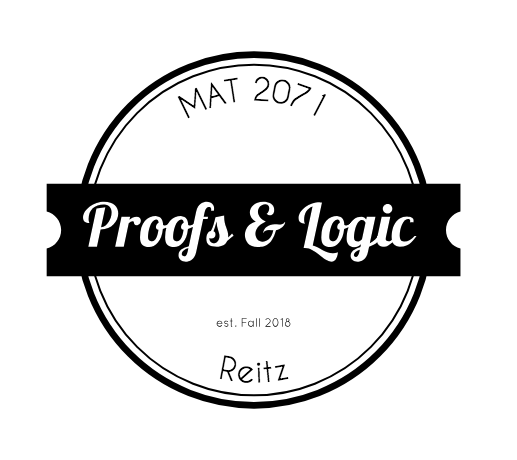Tag: vi hart
Handy Links
 Logic on Math StackExchange
Logic on Math StackExchange
- What do many-valued logics have to do with independence? July 27, 2024This is a similar question to this post Propositional calculus , axiom scheme independence proof. I've read the first chapter of Mendelson's book "Introduction to Mathematical Logic" on propositional logic. After proving the completeness theorem for the system consisting of Modus Ponens and the axiom schemes (A1): A→(B→A) (A2): (A→(B→C))→((A→B)→(A→C)) (A3): (¬A→¬B)→((¬A→B)→A) he goes out […]Nuno Ricardo Serafim
- Non-termination proof for all non-terminating algorithms? July 26, 2024Let Alg be the set of all algorithms (TM descriptions/ python code, etc.). This set is countably infinite. In classical logic, the following statement is provable: HaltOrNotHalt == ∀ alg ∈ Alg : Halts(alg) ∨ DoesNotHalt(alg) where the predicates are defined as follows: Halts(alg) == ∃step:Nat, RunFor(step, alg) = 'halt' DoesNotHalt(alg) == ∀step:Nat, RunFor(step, alg) […]Suraaj K S
- Question regarding Fitch's paradox of knowability July 26, 2024Section 2 of Fitch's paradox of knowability states the following. Let $K$ be the epistemic operator 'it is known by someone at some time that.’ Let $\diamond$ be the modal operator ‘it is possible that’. Suppose the knowability principle (KP)—that all truths are knowable by somebody at some time: $$\text{(KP)} \qquad\qquad \forall p(p\rightarrow \diamond Kp).$$ […]Hans
- Constructive proofs and terminating algorithms July 26, 2024I was thinking about the following judgement: ¬ ∀n:Nat ¬ϕ(n) ⊢ ∃n:Nat ϕ(n) I am not sure whether this can be proven constructively, because intuitively, it doesn't look like I can find a 'witness' n such that ϕ(n). However, we do seem to have an algorithm that can generate witnesses given the premise, because I […]Suraaj K S
- Help for inventing Hilbert-style deduction system for a language containing many logical connectives and quantifiers July 26, 2024The challenge is the following: Create a formal deduction system consisting of Modus Ponens (MP) as the sole inference rule for a language containing the following symbols: ¬ (not) ∧ (and) ∨ (or) → (implies) ↔ (iff) ← (is implied by) ∃ (there exists) ∀ (for all) ↑ (nand) ↓ (nor) ̸→ (doesn't imply) ̸↔ […]Nuno Ricardo Serafim
- Distribution of Universal Quantifiers when arbitrariness is implied July 26, 2024I want to prove that $B \setminus \cup_{i \in I} A_i ) = \cap_{i \in I} (B \setminus A_i )$ supposing that B is a set, $\{A_i | i \in I \}$ is an indexed family of sets, and $I \neq \emptyset$ . I want to do the proof like that: $$ x \in B […]Alex Pi
- Transitivity of subset relation (proof using hypothetical syllogism). July 25, 2024This question is about a comparatively formal approach to a simple theorem. The theorem says, If $ A\subseteq B$ and $ B\subseteq C$ then, $ A\subseteq C$. Symbolically, $ (A\subseteq B\land B\subseteq C)\implies A\subseteq C$. Most probably we can use the hypothetical syllogism $ (A\implies B\land B\implies C) \implies (A\implies C)$ concept and prove it. […]Mystic mystic
- If $A\Rightarrow B$, how does $\bar{A}$ say nothing about B? [closed] July 25, 2024I'm reading Probability Theory by E.T. Jaynes and in the first chapter on plausible reasoning, he states The proposition $A\Rightarrow B$ does not assert that either A or B is true; it means only that $A\bar{B}$ is false, or, what is the same thing, ($\bar{A}$ + B) is true ... On the other hand, if […]Jon Behnken
- Deduction construction examples in Kleene's "Introduction to Metamathematics" July 25, 2024The deductions for construction proposed to readers seam to be pretty easy, but I'm not quite sure in my solution. I'm talking about the example 2 in §20. The first one is to construct $A\&B$ from $A$ and $B$ (I will use $\Rightarrow$ instead of $\supset$ because it is less confusing). $A$ is given. $B$ […]dragondangun
- Can the consistency of a complete recursively axiomatizable be decided? July 25, 2024It's known that the theorems of a complete, recursively axiomatizable theory $T$ must be decidable. Enderton proved this in his Corollary 25G by considering whether $T$ is consistent (Enderton's definition of completeness allows inconsistent theories to be complete): if it's consistent, we can search the proof for $p$ and $\neg p$ in parallel and eventually […]staroperator




Recent Comments